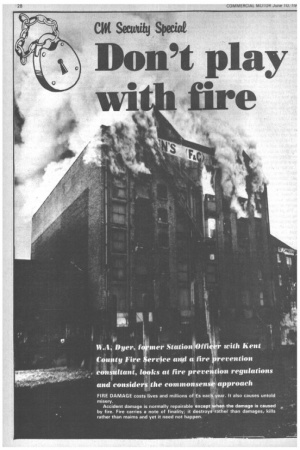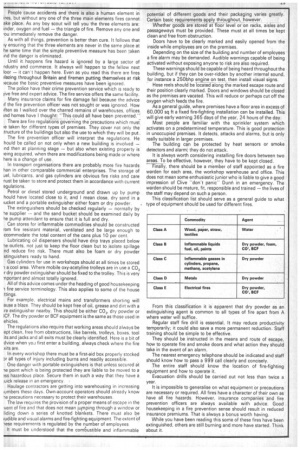OK &mufti Spend
Page 30

Page 31

If you've noticed an error in this article please click here to report it so we can fix it.
Don't play
ri fire People cause accidents and there is also a human element in ires, but without any one of the three main elements fires cannot ake place. As any boy scout will tell you the three elements are: inder, oxygen and fuel — the triangle of fire. Remove any one and ,ou immediately remove the danger.
As with all things, prevention is better than cure. It follows that iy ensuring that the three elements are never in the same place at he same time that the simple preventive measure has been taken Ind the danger is eliminated.
Until it happens fire hazard is ignored by a large sector of ndustry and commerce. It always will happen to the fellow next loor it can't happen here. Even as you read this there are fires lazing.throughout Britain and firemen putting themselves at risk iecause the basic preventive measures have been ignored.
The police have their crime prevention service which is ready to live free and expert advice. The fire service offers the same facility.
Many insurance claims for fire damage fail because the advice if the fire prevention officer was not sought or was ignored. How then as I walked over the charred remains of warehouses, offices
md homes have I thought: "This could all have been prevented.". There are fire regulations governing the precautionswhich must ie taken for different types of premises. They cover not only the
,tructure of the buildings but also the use to which they will be put.
The fire prevention officer will interpret the regulations. He hould be called on not only when a new building is involved - nd then at planning stage -but also when existing property is ieing acquired, when there are modifications being made or where here is a change of use.
In transport organisations there are probably. more fire hazards an in other comparable commercial enterprises. The storage of Jel, lubricants, and gas cylinders are obvious fire risks and care nust be taken to store and protect them in accordance with current egulations.
Petrol or diesel stored underground and drawn up by pump hould have located close to it, and I mean close, dry sand in a iucket and a portable extinguisher either foam or dry powder.
The extinguishers should be checked regularly — normally by le supplier -and the sand bucket should be examined daily by ne pump attendant to ensure that it is full and dry.
Can stores for inflammable commodities should be constructed rom fire resistant material, ventilated and be large enough to ccommodate the total content of the cans plus 10 per cent.
Lubricating oil dispensers should have drip trays placed below le outlets, not just to keep the floor clean but to isolate spillage nd reduce fire risk. There must also be foam or dry powder xtinguishers ready to hand.
Gas cylinders for use in workshops should at all times be stored a cool area. Where mobile oxy-acetyline trolleys are in use a CO2 dry powder extinguisher should be fixed to the trolley. This is very riportant and almost totally ignored.
All of this advice comes under the heading of good housekeeping fire service terminology. This also applies to some of the house ttings.
For example, electrical mains and transformers shorting will ause a blaze They should be kept free of oil, grease and dirt with a re extinguisher nearby. This should be either CO2, dry powder or ;CF. The dry powder or BCF equipment is the same as those used in
ehicles.
The regulations also require that working areas should always be ept clean, free from obstructions, like barrels, trolleys, boxes, tool its and jacks and all exits must be clearly identified. Here is a bit of dvice when you first enter a building, always check where the fire xits are.
In every workshop there must be a first-aid box properly stocked Dr all types of injury including burns and readily accessible.
One danger with portable extinguishers is that unless secured at le point which is being protected they are liable to be moved to a ;ss hazardous place. Secure them in such a way that they have a uick release in an emergency.
Haulage contractors are getting into warehousing in increasing lumbers these days. Own-account operators should already know le precautions necessary to protect their warehouses.
The law requires the provision of a proper means of escape in the vent of fire and that does not mean jumping through a window or liding down a series of knotted blankets. There must also be iudible and visual alarms and fire-fighting equipment. The extent of nese requirements is regulated by the number of employees.
It must be understood that the com6ustible and inflammable
potential of different goods and their packaging varies greatly. Certain basic requirements apply throughout, however.
Whether goo–di-are stored at floor level or on racks, aisles and passageways must be provided. These must at all times be kept clean and free from obstruction.
Doors have to be clearly marked and easily opened from the inside while employees are on the premises.
Depending on the size of the building and number of employees a fire alarm may be demanded. Audible warnings capable of being activated without exposing anyone to risk are also required.
These warnings should be capable of being heard throughout the building, but if they can be over-ridden by another internal sound, for instance a 250bhp engine on test, then install visual signs.
Hose reels should be located along the marked escape route and their position clearly marked. Doors and windows should be closed as the premises are vacated. This will reduce or perhaps cut off the oxygen which feeds the fire.
As a general guide, where premises have a floor area in excess of 60,000 sq ft a fixed fire-fighting installation can be installed. This will give early warning 365 days of the year, 24 hours of the day.
Most people are familiar with the sprinkler system which activates on a predetermined temperature. This is good protection in unoccupied premises. It detects, attacks and alarms, but is only really suitable in larger premises. The building can be protected by heat sensors or smoke detectors and alarm'; they do not attack.
It is always worth considering installing fire doors between two areas. To be effective, however, they have to be kept closed.
Finally, there should be a member of staff appointed as a fire warden for each area, the workshop warehouse and office. This does not mean some enthusiastic junior who is liable to give a good impression of Clive "don't panic" Dunn in an emergency. The warden should be mature, fit, responsible and trained — the lives of the staff may depend on such a person.
This classification list should serve as a general guide to what type of equipment should be used for different fires.
From this classification it is apparent that dry powder as an extinguishing agent is common to all types of fire apart from A where water will suffice.
Regular staff fire drill is essential. It may reduce productivity temporarily; it could also save a more permanent reduction. Staff training should be simple to be effective.
They should be instructed in the means and route of escape, how to operate fire and smoke doors and what action they should take in the event of an alarm.
The nearest emergency telephone should be indicated and staff should know how to pass a 999 call clearly and concisely.
The entire staff should know the location of fire-fighting equipment and how to operate it.
Evacuation drills should be carried out not less than twice a year.
It is impossible to generalise on what equipment or precautions are necessary or required. All fires have a character of their own as have all fire hazards. However, insurance companies and fire prevention officers are always available with advice. Good housekeeping in a fire prevention sense should result in reduced insurance premiums. That is always a bonus worth having.
While you have been reading this some of these fires have been extinguished, others are still burning and more have started, Think about it.




























































































